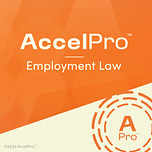Welcome to AccelPro Employment Law, where we provide expert interviews and coaching to accelerate your professional development. Today we’re featuring a conversation about the changing union landscape. Our guest is Cristina Gallo, a partner at Cohen, Weiss and Simon.
Unions are creeping into new industries, the National Labor Relations Board is increasingly favoring workers’ rights, and some companies are fighting more aggressively once organization efforts start.
Having grown up in a union family and worked as a campaigner before she was a lawyer, Gallo has been in the trenches for much of her life. Today she is outside counsel for Workers United, the union representing Starbucks employees.
In this interview, she explains the changing role of social media in organizing, the strategies Starbucks has used against organizers, and her own personal passion for workers’ rights. The supplemental materials and episode transcript are available below.
AccelPro’s expert interviews and coaching accelerate your professional development. Join AccelPro Employment Law now for a free trial of everything we offer to members.
Interview References:
Cristina Gallo’s Cohen, Weiss and Simon profile
12:13 | Shierholz, H., Poydock, M., & McNicholas, C. (2023, January 19). Unionization increased by 200,000 in 2022. Economic Policy Institute.
TRANSCRIPT
I. SOCIAL MEDIA, CORPORATE IMAGES AND LEVERAGE
Matt Crossman, Host: You have a long history in labor, both personally and professionally. Let’s start there because I think your background is important on this topic. Did you grow up in a union family?
Cristina Gallo: I did, in fact, grow up in a union family. My sister has been an organizer for approximately 30 years. And my grandparents on one side were union members and activists in their unions.
MC: What is your role representing the union for Starbucks workers?
CG: I am outside counsel at Cohen, Weiss and Simon for the union Workers United, which is the union that is undertaking to represent Starbucks workers and leading the Starbucks Workers United campaign. In that role, we help to organize new shops, deal with the National Labor Relations Board representation election process and handle all of the litigation that has ensued from those representation elections.
That has quieted down a little bit. We’ve moved into dealing with a lot of the alleged unfair labor practice charges against the company. Those are also with the National Labor Relations Board. And then we provide advice and counsel to the organizers who are day-to-day managing this nascent relationship with Starbucks and attempting to bargain first contracts.
MC: Unions have been in the news a lot in the last few years. What have you learned from this experience that other labor attorneys and HR executives need to know?
CG: I think this particular campaign is something folks in the industry should be paying attention to, and I think that is part of the reason that it’s generated so much news coverage.
This is a service-sector employer, which is an area of the economy that’s been historically difficult to organize and has low union density, so that’s noteworthy. It has a very young workforce. Young folks are known to have more favorable attitudes toward unionization than those in older generations. What I think is also significant about this campaign is the influence and the function of social media as part of the organizing.
Even though social media has been a part of campaigns in the past, what was interesting here is that the social media coverage and use of social media actually drove the further unionization, so it sparked more interest. It sparked more campaigns. It allowed the campaign to spread organically in a way that folks in the industry should pay attention to.
The employer, Starbucks, has attempted to, over the course of time, have a progressive branding and image that I think has been a liability to it in the organizing campaign. I think that employees are pretty attuned to a mismatch between a branding ethos and a marketing message and conditions on the ground that they face.
MC: You brought up a couple things I want to follow up on. The first one is social media and the ability to report things that didn’t used to get reported. It seems like it helps both in the wider world that somebody who’s not necessarily working for Starbucks will become aware of what’s happening, but also is it a way for Starbucks employees who might want to join the union to find out what’s going on in a way they couldn’t find out before?
CG: Yes, definitely. It’s helped in both respects. It helps generate public interest, enthusiasm and support for the campaign among members of the public and potentially members of the public who historically may not have been attuned to a union campaign.
But I think what’s very notable in this case, it facilitates the ability of workers who have not yet been approached by a union organizer to say, “hey, wait, we’re part of something, too. We can do this here, too, and we can start the momentum right here ourselves” and reach out affirmatively to the union.
Historically in campaigns, it’s not that the union has always been the seed. Oftentimes workers do come to the union, but in this particular case, there were a lot of different workers and a lot of places coming to the union.
MC: Corporate social responsibility and ESG are much more prominent now than they used to be. I wonder if from your perspective, that is a good point of leverage that organizers can use as a pressure point for Starbucks to say, “Hey, you have this progressive image, but the way that you’re treating the workers doesn’t line up with that.”
And so you can use that to almost guilt them or shame them into cooperating more. Is that true?
Listen to this episode with a 7-day free trial
Subscribe to AccelPro | Employment & Labor Law to listen to this post and get 7 days of free access to the full post archives.












